NRL 2021: Jackson Hastings is ready to make a comeback
Jackson Hastings admits being a ‘bit of a dickhead’ led to his exile from the NRL but now the son of a rugby league legend wants to come back.
NRL
Don't miss out on the headlines from NRL. Followed categories will be added to My News.
Jackson Hastings, the son of Roosters legend Kevin, describes himself as the lucky kid that made himself unlucky.
Exiled from the NRL at just 22-years old after being cut from the Roosters and the Sea Eagles for being a self-proclaimed ‘dickhead’, Hastings has been rebuilding his rugby league career and his reputation in England.
Hastings made history in 2019 becoming the first Salford player to win England’s highest individual accolade, the Man of Steel award.
In an honest and candid interview, Hastings tells all about his short but colourful career and why, at 25, he is ready to right his wrongs in the NRL.
You have spent the summer back home and have seen the headlines linking you to NRL clubs. Is a comeback on the cards?
The plan was always to eventually come back to Australia and hopefully get a deal to play in the NRL. I’ve been very lucky to go to England and play some pretty good footy and work on rebuilding my image. Australia is home, but this is where I didn’t fulfil my potential. I’d love to come back and change people’s perception of me, everyone knows what note I left on. I want people to know the real Jackson Hastings, not the person they saw four or five years ago.
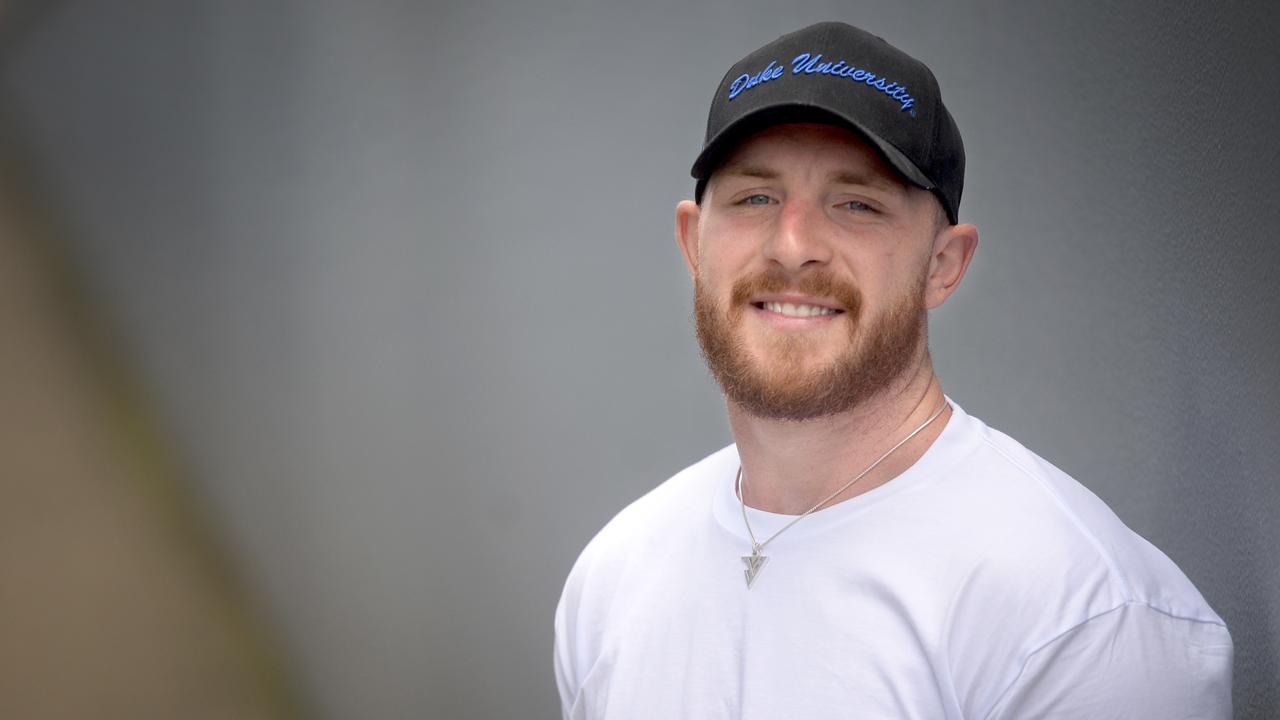
Who is the real Jackson Hastings?
When I came through the NRL I was a kid, I was immature and put other things in front of footy. It led to me being labelled things I didn’t want to be. I could make plenty of excuses as to why it didn’t work out for me. But at the end of the day, I just didn’t play good enough and I wasn’t a good enough person. I do things differently now. I wake up early, I walk, I get out of bed, I don’t sleep until my alarm and rush to training. I’m there early. I’m a better person to be around. I feel like I’ve had to put a lot of hard work into that. I just love the game and I never want to ever put that in jeopardy ever again.
OK, let’s talk about that, what you were like to be around at the Roosters. You joined in 2013, made your debut in 2014 but things didn’t go as you expected and you were cut in 2016. There was talk you rubbed up senior players the wrong way at times?
I was a young kid that had a lot of expectations and I probably believed those expectations before the expectations became reality. I have no hard feelings towards the club. The Roosters are a club that demands success. Different incidents happened that put me in the deep end … I’m sure the people at the club that were there when I was there, senior players that are probably still there now, would have a few colourful words to describe me as a kid. At the time you’re thinking, ‘why are they saying that about me?’. On reflection, I understand. I’m 25 now and look at kids at my club and they act like I did at the same age and I realised I never gave myself a chance. I can’t speak highly enough about the club, although they did get rid of me, they made a great business decision. I was an immature kid that made a lot of wrong decisions. They won the title in 2018 with Luke Keary, it was a no-brainer for them.
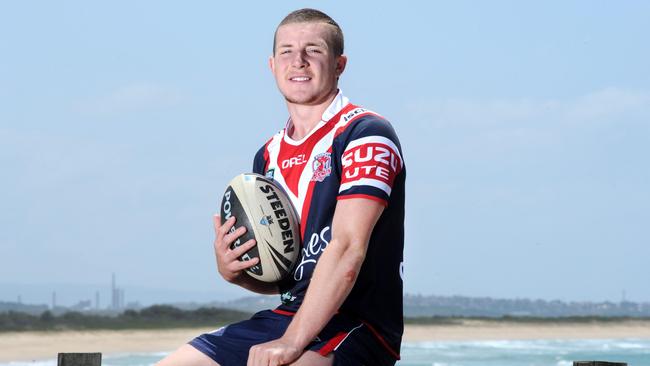
What’s your relationship with Trent Robinson like now?
He’s the best coach in the game and certainly a really good human being. He actually really cares about his players. He never said anything wrong to me, never did anything wrong by me. There‘s no bad blood between me and the Roosters at all. I still watch them when they’re on, they’re the team I supported as a kid. I text him after the Roosters won the 2019 grand final and he replied congratulating me on making the grand final with Salford.
So you move on to Manly in 2017 and things take a turn for the worse. You’re involved in a much publicised incident with skipper Daly Cherry-Evans in Gladstone, Queensland, on an away trip.
That was that was the hardest stage of my life for sure, especially after all the stuff that happened in Gladstone and the fallout from that and just how it was dealt with, I think that’s what disappointed me most. And then the fallout from that with the media in some of the stuff reported wasn’t true. Sometimes I wish I had spoken up and said my bit, but at the same time, I didn’t really feel like I had any leg to stand on because obviously I had been in trouble before and was in trouble again. I took advice and I said nothing.
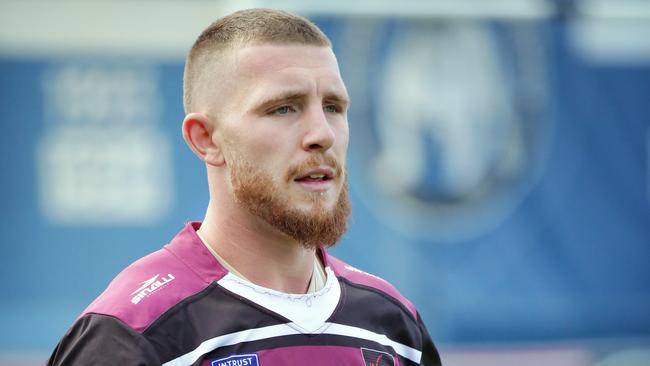
A lot was written and said about your role in the incident. Do you feel like you were an easy scapegoat?
I mean, everyone involved, I think would probably admit to that. And again, I’m not chasing sympathy from anyone because I was involved in it. I’ve owned my errors and have made silly mistakes, but yeah, I was the easy target. That’s why I’ve really had to learn … you can sit and sulk or you can realise that if you didn’t put yourself in this situation, you wouldn’t have to deal with the consequences. But in the end I was involved. I had made mistakes previously and I had to take a long hard look at myself and understand why it happened to me and fix it and which is what I’ve done.
There’s no bad blood with you and the Roosters. But your relationship with then Manly coach Trent Barrett soured after the Gladstone incident. What is your relationship with Cherry-Evans and Barrett like now?
I don’t have any hard feelings towards Daly at all. I respect the bloke so much as a rugby league player, and a father. I think he is a role model for the game. You know, we both made a decision that night and what happened happened. I live across the road from Trent, down on the south coast. I haven’t had words with Trent but I have seen him around. And, you know, it is a little bit awkward because growing up, Trent was one of my favourite players. Some days he used to kick the ball around with me. Trent admitted that he could have handled the situation better and he’s grown from the experience too. I hold no grudges at all. I go back to … if I had kept myself out of trouble then, Trent wouldn‘t have had to deal with any situation. I’m a man, he’s a man and if we crossed paths I’m happy to shake his hand and bury the hatchet.
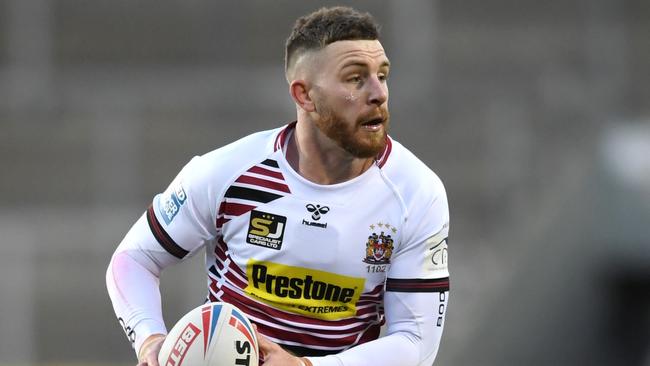
So, now you’re 22 and released from Manly and your manager Sam Ayoub tells you no other NRL clubs are interested in signing you. What’s going through your mind?
It was heartbreaking. But that’s the reality I was facing as a 22-year-old kid that had a couple of chances to play NRL and had blown both. And I only really have myself to blame. So, you know, I was sitting at home, watching kids my age play great footy on TV and making representative sides, doing everything that I’ve always wanted to do. I was training with Blacktown at the time and then the opportunity arose to go to England. There were a couple of teams that were willing to take a punt and willing to give me a chance to go over there and play and redeem and prove myself again. I remember meeting with Sam and my mother. He has always been honest with me. He turned to my mother and said, ‘the sentiment about Jacko is poor, to change that we need to get him away from it, for a year or two. Let his football do the talking, we’ll take him to England as a boy and he’ll come back, a man!’
You’ve had a great run in England, you helped Salford beat relegation, took them and then Wigan to a grand final and was named the ‘Man of Steel’. Are you ready to be an NRL player again? Do you see yourself at any club in particular?
Beggars can’t be choosers. You only need one club to show interest in. I’m not too bothered if the club’s been coming last or coming first. All I want to do is fit into a culture and earn the respect of the playing group that’s there, the coaching staff also. But then secondly, just being able to fit in and play the style of footy that’s going to make myself and hopefully that club successful. I left on sour terms and was looked on in a negative light. Not many people respected the way I played. That’s just been in the back of my mind ever since I went to England. I struggled with relationships with players and coaching staff. But, you know, I still talk to Ian Watson my old Salford coach. I’m really close with the CEO of Salford. I’m close to the players that were there. I’m close to all the boys of Wigan now. I’m close to the coaching staff there, too. So that’s just a further development in Jackson Hastings.
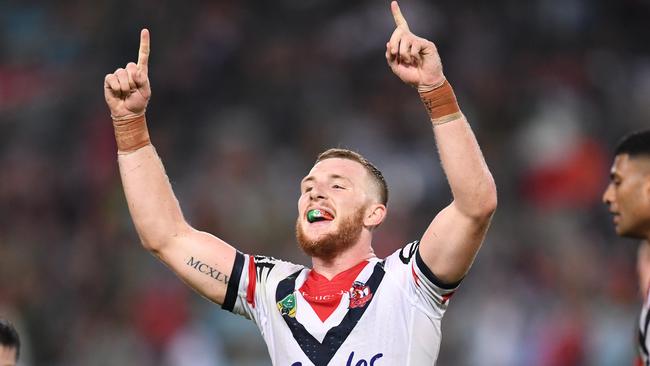
Do you feel like you are writing your own redemption story?
I have made mistakes, but also I know I’m not a bad person. Yeah, I’ve said things and done things that are that, that I’m not proud of. But I also know that I’ve done a lot of great things within the community and game that were overshadowed by my undoing and my wrongdoings. For me, it’s just a story of finding myself. What do I want to be? What do I want to achieve in life? Do I want to be this kid that had all this talent and threw it away from being a bit of a dickhead? Or do I want to learn from what’s happened before me as a 22-year-old and move forward with the rest of my life and footy career and be a role model to kids that are tossed up as being either good or bad can look at and say ‘well, you know, he had a couple of chances and on his last one, he turned it all around.’
More Coverage
Originally published as NRL 2021: Jackson Hastings is ready to make a comeback






